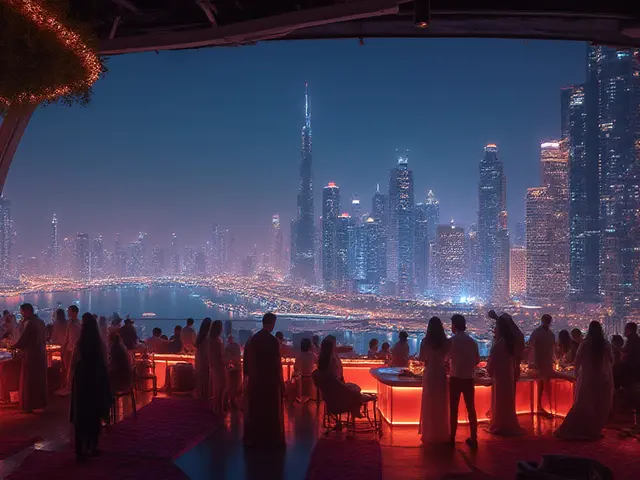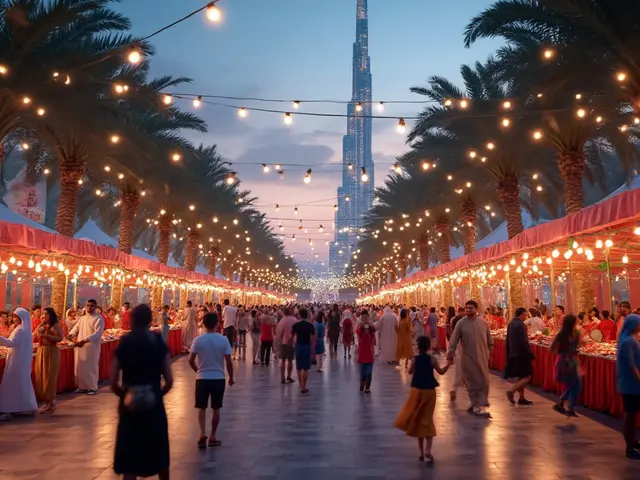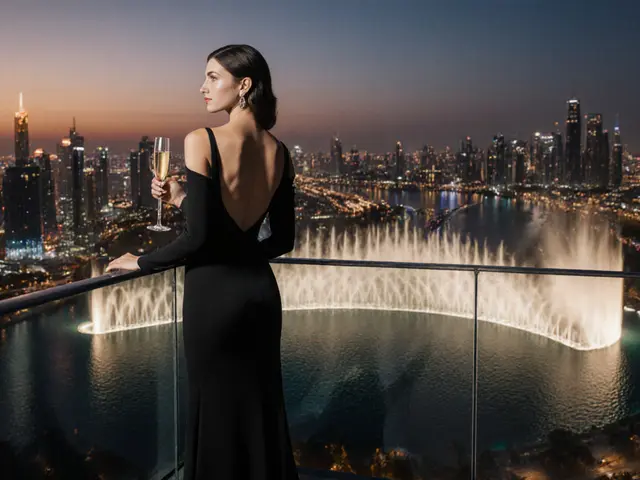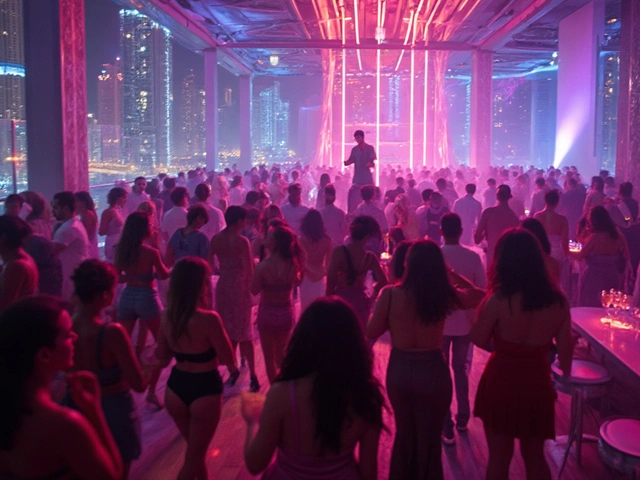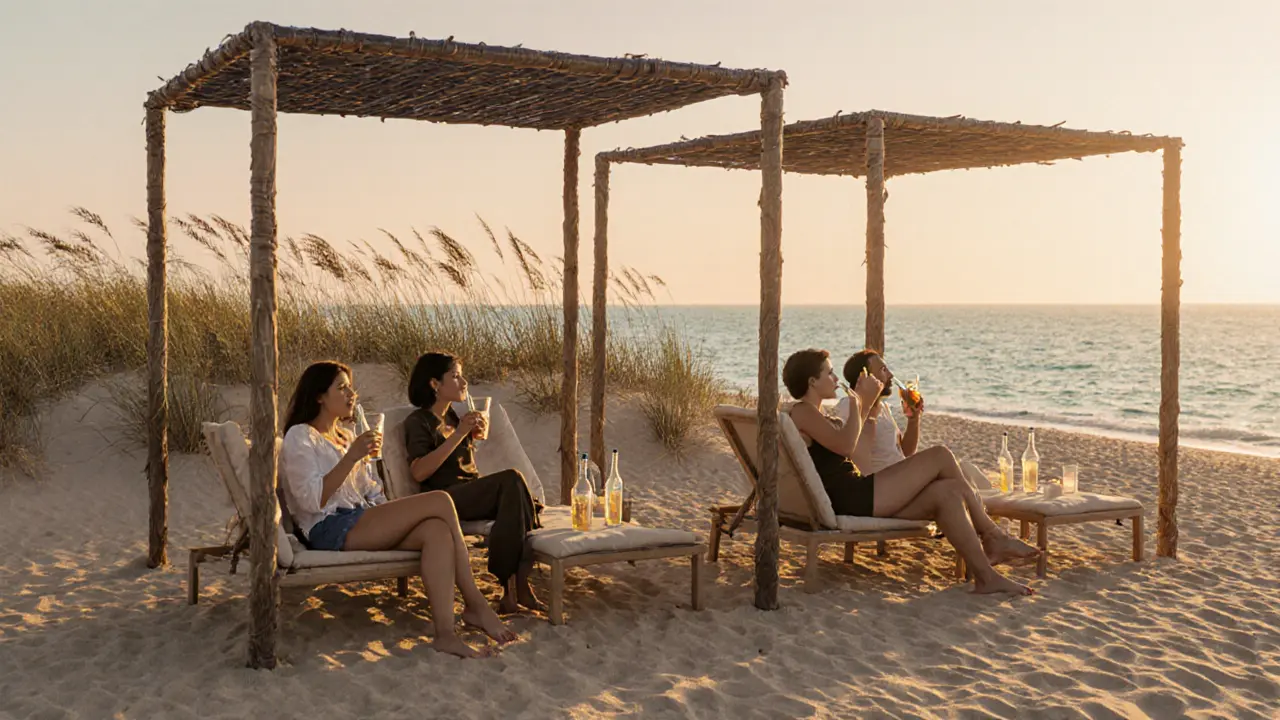
In Dubai, where the coastline stretches over 700 kilometers and beach clubs are part of the weekend ritual, it’s easy to forget how much strain these popular spots put on the environment. From single-use plastic cocktails to diesel-powered jet skis churning up the water, many beach clubs still operate like they did a decade ago. But things are changing. More residents and visitors are asking: eco-friendly beach clubs in Dubai - do they even exist? The answer is yes, and they’re growing fast.
What Makes a Beach Club Truly Eco-Friendly?
An eco-friendly beach club isn’t just about putting up a few recycling bins or calling itself ‘green’ on Instagram. It’s a full-system approach. In Dubai, where water is scarce and heat is relentless, sustainability means real action: solar power, zero single-use plastics, native landscaping, and waste-to-resource programs.
Take La Perle Beach at Jumeirah Beach Residence. They replaced all plastic straws with seaweed-based alternatives and installed solar canopies over every lounge area. Their kitchen sources seafood only from certified Emirati fishermen who follow UAE’s seasonal catch limits. Even their cleaning staff uses biodegradable detergents approved by the Dubai Municipality’s Environmental Protection Division.
Another example is Beach One at Al Qasr, Madinat Jumeirah. They harvest rainwater from their rooftop to irrigate the dune grasses planted along the shoreline - a smart move, since native plants like Haloxylon salicornicum need 70% less water than imported palm trees. They also partner with Green UAE, a local NGO, to host monthly beach cleanups where guests can swap a plastic bottle for a free coconut water.
Why This Matters in Dubai’s Climate
Dubai’s beaches aren’t just for lounging - they’re fragile ecosystems. The Gulf’s waters are warming faster than the global average, and coral reefs near Ras Al Khor have declined by 40% since 2018. Many beach clubs still use concrete seawalls that destroy natural sediment flow, leading to erosion. Others pump treated wastewater into the sea to refill pools - a practice that increases salinity and harms marine life.
The smartest eco-beach clubs in Dubai treat the shoreline as a living resource, not a backdrop. At Cielo Beach in Dubai Marina, they don’t just remove trash - they track it. Every piece of plastic collected is logged and reported to the Dubai Environment Agency. Their data helped push the city to ban single-use plastics at all licensed beach venues in 2024.
And it’s not just about the environment. It’s about culture. In the UAE, sustainability isn’t a trend - it’s rooted in tradition. Bedouin communities historically lived with minimal waste, reused everything, and respected the desert’s limits. Modern eco-beach clubs are reviving that mindset. At Al Maha Beach Club in Mina Rashid, staff wear traditional thobes made from organic cotton, and music nights feature Emirati oud players instead of loud DJs - reducing noise pollution and honoring local heritage.
How to Spot a Genuine Eco-Friendly Beach Club
Not every place that says ‘green’ is actually green. Here’s how to tell the difference in Dubai:
- Check for visible solar panels or wind turbines - not just a logo on a menu.
- Ask if they use refillable glass bottles for drinks. If they still serve cocktails in plastic cups, walk away.
- Look for certifications: Look for the Dubai Green Building Regulations seal or membership in UAE’s Green Agenda 2030.
- See if they have a waste sorting station with clear labels - and if staff actually use it.
- Ask about their water source. True eco-clubs use desalinated water only for drinking, not for pool topping or hose-downs.
At Beach 7 in Kite Beach, they even have a ‘Bring Your Own Towel’ policy to cut laundry loads. Their towels are made from recycled ocean plastic, and for every one rented, they fund the removal of 10 plastic bottles from Dubai’s waters.
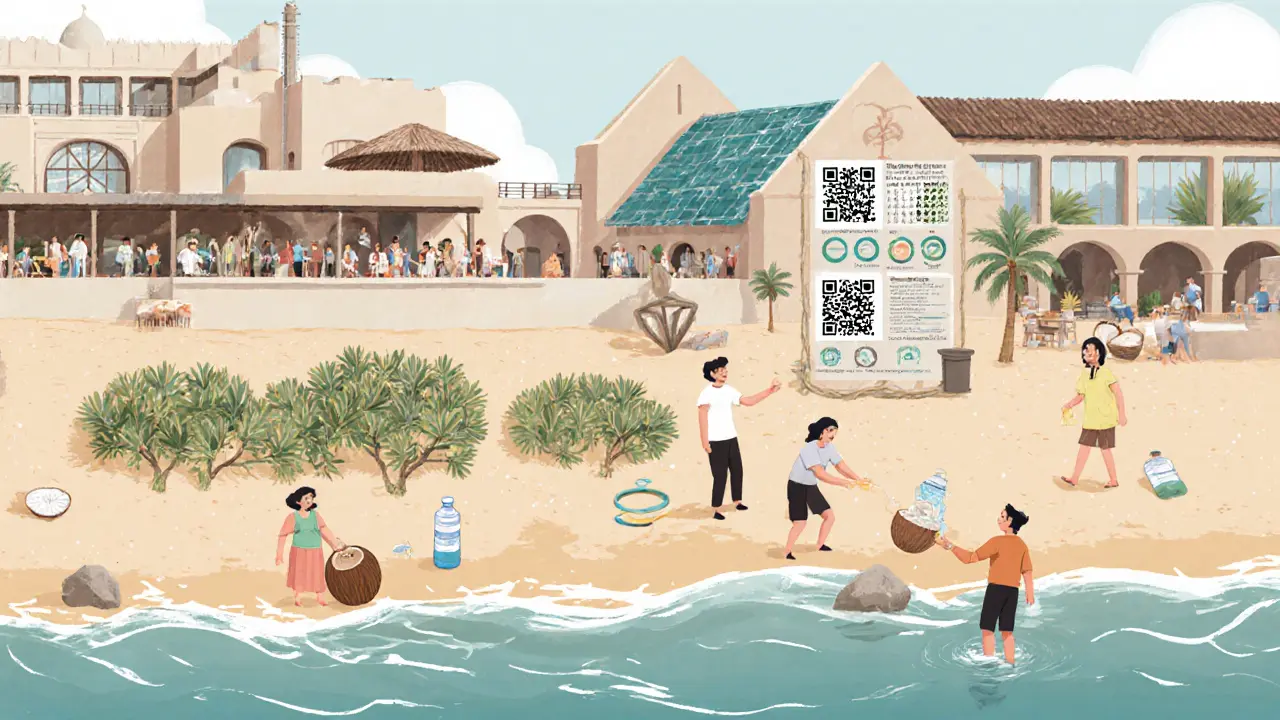
What You Can Do as a Guest
Being eco-conscious doesn’t mean sacrificing comfort - it means making smarter choices. Here’s how to support sustainable beach clubs in Dubai:
- Bring your own reusable bottle - many clubs now offer free water refills.
- Use public transport or ride-share apps like Careem to get there. Parking lots at beach clubs are major carbon sources.
- Join a cleanup. Clubs like Al Fattan Currency House Beach host weekly volunteer days - no experience needed.
- Pay attention to menu items. Choose local seafood like Sayyadiah (spiced fish) over imported prawns shipped from Thailand.
- Leave nothing behind. Even biodegradable palm leaf plates can take months to break down in saltwater.
Pro tip: Visit during weekdays. Weekend crowds at Dubai’s top beach clubs use 3x more energy and water. A quiet Tuesday at La Perle feels just as luxurious - and leaves a smaller footprint.
The Future of Beach Clubs in Dubai
Dubai’s government isn’t waiting for change - it’s driving it. In 2025, the Dubai Supreme Council of Energy announced a new rule: all new beach club licenses must include renewable energy systems and zero-waste plans. Existing clubs have until 2027 to comply.
That’s why places like W Dubai - The Palm are already installing underwater solar arrays to power their floating lounges. Others are testing algae-based bioplastics for food containers - a breakthrough developed by Khalifa University researchers.
And it’s not just about the environment. These changes are making beach clubs more authentic. The best ones now feel less like party zones and more like extensions of Dubai’s natural beauty - places where you can relax, sip a mint-infused lemonade in a glass bottle, and know you’re not harming the very thing you came to enjoy.
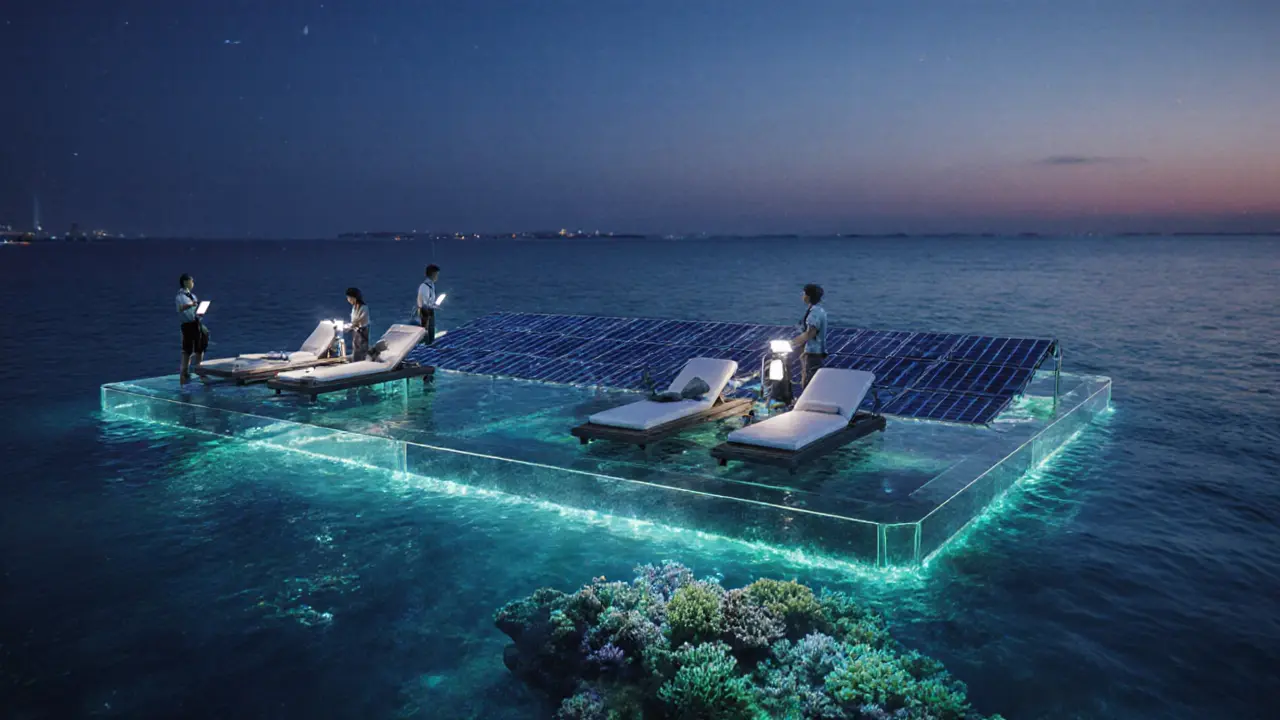
Where to Go This Weekend
Here are five truly eco-friendly beach clubs in Dubai you can visit right now:
- La Perle Beach - JBR: Solar-powered, zero plastic, local seafood, monthly coral restoration workshops.
- Beach One - Madinat Jumeirah: Rainwater harvesting, native dune planting, free coconut water for bottle returns.
- Cielo Beach - Dubai Marina: Full waste tracking system, partnered with Dubai Environment Agency, no jet skis allowed.
- Beach 7 - Kite Beach: Towel rental program funds ocean cleanup, organic cotton loungewear, wind-powered shade structures.
- Al Maha Beach Club - Mina Rashid: Traditional Emirati design, organic cotton textiles, oud music nights, no amplified sound after 8 PM.
Each of these spots has a public dashboard showing real-time metrics: energy saved, plastic removed, water conserved. You can scan the QR code at your table to see your impact - and even donate to local marine conservation projects.
Why Sustainability Is the New Luxury in Dubai
For years, luxury in Dubai meant marble floors, gold-plated fixtures, and private yacht access. Now, the new luxury is knowing your weekend by the sea didn’t cost the planet.
It’s not about guilt. It’s about pride. Dubai’s future isn’t just in its skyscrapers - it’s in its dunes, its reefs, its clean beaches. The best beach clubs now understand that true hospitality means protecting the place you’re hosting people in.
Next time you book a day at the beach, ask: Is this place giving back? Or just taking?
Are there any eco-friendly beach clubs in Dubai that are family-friendly?
Yes. Beach One at Madinat Jumeirah and Beach 7 at Kite Beach both have dedicated family zones with shallow, calm waters, shaded play areas made from recycled materials, and kid-friendly meals served in compostable containers. They also offer free environmental storytelling sessions for children every Saturday morning.
Do eco-friendly beach clubs in Dubai cost more?
Not necessarily. Entry fees at La Perle and Cielo Beach are similar to mainstream clubs - around AED 150-200 per person. What’s different is what you’re paying for: no hidden costs for single-use items, no plastic waste, and real environmental impact. Many offer discounts for bringing your own towel or reusable bottle.
Can I bring my own food and drinks to eco-beach clubs in Dubai?
Most allow it, but with rules. Al Maha Beach Club permits homemade meals in reusable containers but bans alcohol and single-use packaging. Beach 7 lets you bring snacks, but you must use their designated recycling station. Always check their policy - some clubs have licensing restrictions on outside food.
How do I know if a beach club’s sustainability claims are real?
Look for public data. The best eco-beach clubs display real-time stats on energy use, plastic waste removed, and water saved via QR codes at tables. Also check if they’re listed on Dubai Municipality’s Green Venue Registry or partnered with verified NGOs like Green UAE or Emirates Nature-WWF. If they only say ‘we’re green’ without proof, it’s likely greenwashing.
Are there eco-beach clubs outside of Dubai city limits?
Yes. In Ras Al Khaimah, Al Hamra Beach Club uses solar-powered showers and partners with local fishermen for sustainable seafood. In Fujairah, Al Bait Beach Lounge runs on wind energy and has a coral nursery where guests can sponsor a fragment. These are quieter, less crowded, and just as committed to sustainability.
What’s Next for Sustainable Beach Culture in Dubai?
The movement is gaining momentum. In 2026, Dubai plans to launch its first fully carbon-neutral beach club - powered entirely by solar, desalinated by wind, and built with recycled steel from the city’s old infrastructure. It’s called Reef & Rise, and it’s set to open on the eastern edge of the Palm Jumeirah.
For now, the best thing you can do is choose wisely. Every time you pick an eco-beach club over a traditional one, you’re voting for the kind of Dubai you want to live in - one that respects its environment, honors its traditions, and still knows how to have a great time.
